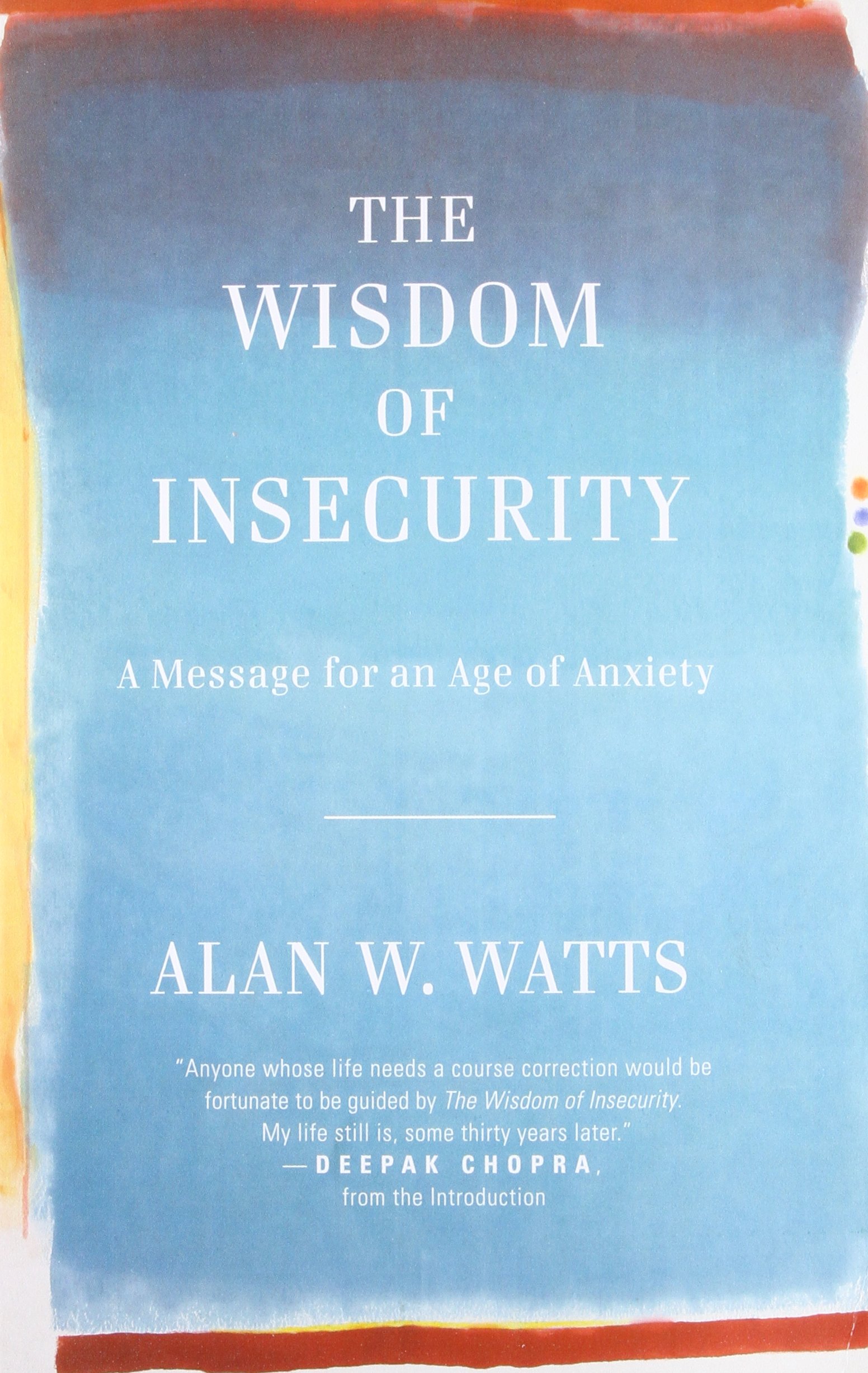The Wisdom of Insecurity Summary

6 min read ⌚

MicroSummary: “The Wisdom of Insecurity,” as its subtitle suggests, is Alan Watts’ book-length message to the inhabitants of an age of anxiety, i.e. us. And the message is simple: don’t chase happiness or live for tomorrow; live in the present moment – because that’s the only place where happiness ever was or will be.
A Message for an Age of Anxiety
Have you ever felt like you’re constantly and futilely chasing happiness?
Alan Watts would not take it!
In “The Wisdom of Insecurity” he advises you to embrace the now and stop worrying about the future.
And here’s his train of thought.
Who Should Read “The Wisdom of Insecurity”? And Why?
“The Wisdom of Insecurity” is “The Power of Now” about 40 years before Eckhart Tolle’s book. So, just like “The Power of Now,” “The Wisdom of Insecurity” is about everyone. Depressed and anxious people especially.
With Allan Watts, they might find a way to slow down and smell the roses.
About Alan Watts
 Alan Wilson Watts was a British philosopher, best known as one of the first Western popularizers of Eastern spirituality. In fact, his 1957, “The Way of Zen,” is considered to be the first bestseller on Buddhism in the Western hemisphere.
Alan Wilson Watts was a British philosopher, best known as one of the first Western popularizers of Eastern spirituality. In fact, his 1957, “The Way of Zen,” is considered to be the first bestseller on Buddhism in the Western hemisphere.
Trained to become an Episcopal priest, Watts turned out to be a cult figure, almost a guru for millions of Americans even during his lifetime. Almost half a century after his death, his writing still resonate with the young and the lost.
“The Wisdom of Insecurity Summary”
Let us take you back to 1964:
“I don’t care too much for money, money can’t buy me love…” – sang the Beatles. And the world sang with them. And nobody really got the message.
Even though it was there for a while!
Alan Watts, for example, wrote “The Wisdom of Insecurity” almost a decade and a half before the Beatles single. And he was also trying to convince the world that money and love are two completely unrelated concepts!
You see, just like many other thinkers during that period, Watts was profoundly worried by the way you’re living your life in a world without god.
Because, like it or hate it right now, scholars agree that for millennia religion was the ultimate manager of human life. The sheer belief in the concept of an afterlife made people rethink their choices and decisions in this life – at least from time to time.
Moreover, it also helped some other thinkers similar to Watts devise related concepts which further advanced the ethical aspects of living.
But then, evolution happened and the two world wars brought atrocities previously unimaginable to the human mind. And, suddenly, all was empty: there was no god, and without god, there was no reason to be ethical as well.
According to Watts, the vacuum created by the absence of god was filled with a primitive consumeristic drive. If there are no consequences after death, then the only thing you needed to do here is concoct a “how-not-to-get-caught” plan.
No commandments – no problem!
Suddenly everything from stealing to taking drugs to having casual sex with everybody was allowed. The humbler couldn’t bear the mayhem. So, they either went into a state of depression or started overworking themselves to exhaustion.
Did any of it fill the emptiness?
Of course, it didn’t. It merely made things worse.
Because, constant stimulation leads to desensitizing. Show me a person who has worked or partied hard – says Watts – and I’ll show you a human being who has deadened his senses! We can be a bit blunter: capitalistic consumerism leads to self-destruction.
And it doesn’t really matter whether you’re spending your money on alcohol, expensive cars, or large mansions. It’s all the same!
As a matter of fact, Watts compares consumerism to addiction. You start with a beer or two, but you move on to several wines and then to hard liquors. You haven’t even noticed how your senses died out in the process. And how you are aimlessly chasing happiness, while descending further and further down.
And happiness is not in the more – it’s in the less.
A great way to illustrate the gist of Watts’ philosophy is by reminding you of a wonderful short story written by German Nobel Prize winner Heinrich Böll.
A well-to-do photographer notices a poor fisherman napping in a fishing boat. He scolds him for not working. The fisherman explains that he is resting because he was fishing in the morning and he has already caught enough fish for two days.
The photographer objects: “There’s your chance,” he says. “If luck served you well so far, why shouldn’t serve you even better if you keep fishing?” And then he tells him how the fish surplus will get him a motor boat in time which will get him even more fish, which will help him buy a net.
After a while, this should get the fisherman enough money to buy him a factory, build a fish restaurant and even export fish and lobsters in Paris.
“And then?” – asks the fisherman.
“Then,” says the photographer, “you could sit here carelessly, caressed by the sunbeams, while looking at the beautiful sea.”
“But, I’m already doing that,” replies the fisherman.
The photographer leaves with envy, instead of pity.
And Alan Watts asks you why would you act in any manner other than the fisherman’s.
Don’t overthink it, he pleads. Just live your life with as little worry and anxiety as you can. And you can do this if you stop thinking about the future and live in the now. If you recognize pain as part of pleasure, and mind as part of your body.
If you listen to your body attentively.
And if you love Love – instead of money.
Key Lessons from “The Wisdom of Insecurity”
1. Everything Is Allowed in a Godless World (But That’s Not a Good Thing)
2. Don’t Take Photos of Your Meals – Eat Them (If You Want To)
3. There Is Such Thing as a Gut Feeling (Follow It)
Everything Is Allowed in a Godless World (But That’s Not a Good Thing)
In 1882, German philosopher Friedrich Nietzsche proclaimed: “God is dead!” And few years before him, everyone’s favorite Russian darker, Fyodor Mikhailovich Dostoyevsky, tried to understand what it would mean to live in a godless world. And you’ve guessed it: it’s bleak to even think about it!
Because, no god means no reason to be good. Some even believe that this is the fundamental problem with atheism. Nevertheless, Watts says: you must fight consumerism because it is bad in itself, god or no god. It’s a bottomless pit and it doesn’t fill your need for happiness.
On the contrary, in fact!
Don’t Take Photos of Your Meals – Eat Them (If You Want To)
Have you ever been to a restaurant and taken a photo of your meal so as to post it on Facebook or Instagram?
Here’s a simple question: why?
After all, the meal might even have been bad. But, you wanted to show to the world beforehand how good it looks like. News flash: meals are not paintings!
Live through your experiences! Don’t virtualize them.
There’s quite enough virtual existence as it currently stands.
There Is Such Thing as a Gut Feeling (Follow It)
You know why you won’t find a single fat tiger in the wild? Because, their body tells them when they are full and when they are not. Our bodies did that too – when there was scarcity of food. But, in the meantime, we kind of messed up the regulatory mechanism.
Fortunately, they’re still there. You know them as “intuition” or “gut feeling.”
And it may sound a bit corny, but it wouldn’t hurt, from time to time, if you followed them! In other words: eat only if you’re hungry. Not because – well, it’s there on the table and it smells nice.
Like this summary? We’d Like to invite you to download our free 12 min app, for more amazing summaries and audiobooks.
“The Wisdom of Insecurity” Quotes
There is no other reality than present reality, so that, even if one were to live for endless ages, to live for the future would be to miss the point everlastingly. Share on X What we have forgotten is that thoughts and words are conventions, and that it is fatal to take conventions too seriously. Share on X A convention is a social convenience, as, for example, money… In somewhat the same way, thoughts, ideas and words are ‘coins’ for real things. Share on X If we cling to belief in God, we cannot likewise have faith, since faith is not clinging but letting go. Share on X What we have to discover is that there is no safety, that seeking is painful, and that when we imagine that we have found it, we don’t like it. Share on XOur Critical Review
“The Wisdom of Insecurity” is, really, a book everyone should read. Alan Watts wrote it more than seventy years ago, and it seems like he was ahead of his times!
Our age is much more anxious than his. And we are much less happy. This book may help you find a way out. Or, at least, understand why.








